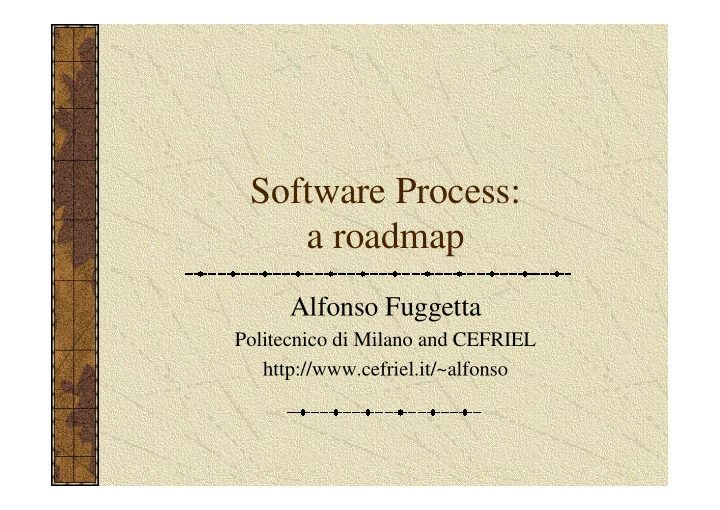

Software Process: a roadmap Alfonso Fuggetta Politecnico di Milano and CEFRIEL http://www.cefriel.it/~alfonso
Goals of the presentation Propose some reflections on the state of the art in software process research and practice. Identify possible research directions for the future. Discuss some challenges for practitioners.
Contents of the presentation Some quick comments on the history and areas of concern of software process research Failures and successes The road ahead
Disclaimer My very personal opinion. Just a few general comments that can fit in a short presentation. I’ll try to be provocative. See: A. Fuggetta. Software Process: a roadmap. In A. Finkelstein, ed. Future of Software Engineering. 22 nd International Conference on Software Engineering (ICSE 2000), June 2000, Limerick (Ireland), ACM Press.
The starting point There is some evidence that better processes are instrumental to deliver better products. This has motivated research devoted to study, improve, automate processes. Indeed, we should question this assumption. Is it always the case? • Motorola: CMM Level 5. • Nokia: CMM Level 1. • Can we (customers) tell the difference? Anyway, let’s see the most important achievements.
The notion of process Developing software is not just a matter of buying tools. Areas of concern: Development technology. Methods and techniques. Organizational behaviour and social sciences. Marketing and economy. Increasing importance of the interplay of organizational, cultural, technological, and economic factors.
Process modeling and support Languages and environments for Process understanding Process design Training and education (on processes) Simulation and optimization Process support Many differerent paradigms (rules, Petri nets, statecharts, IDEF/SADT, ...).
Process improvement Models to evaluate the maturity of a software process: CMM, ISO 9000, MBA Methods to guide the process improvement activity: IDEAL SPICE
Metrics and empirical studies Definition of metrics and metrics selection techniques. GQM Empirical methods: how to carry out experiments. Empirical results: “X is better than Y”.
Processes, eventually! Best practices. Two examples: Personal Software Process. Unified Software Process.
Summing up ... Certainly, relevant achievements. However, there are also several problems. It is necessary to assess and evaluate what has been done so far.
SW processes are processes too Certainly, software processes have their specific characteristics and facets. Nevertheless, they are “processes” with strong similarities with many other engineering processes. Sometimes we have reinvented the wheel and not reused existing experiences.
PML/PSEE must be re-thought Modeling languages are often too complex to support effective process description. Also, sometimes we want to support what can’t be supported. Existing technology is too complex, intrusive, and pervasive. Example of effective technology to support processes: configuration management.
Empirical studies are a means not an end Sometimes, empirical studies are just statistical exercises. Fishing for results. What about Significance? External validity?
Software process improvement is process improvement too We have often considered SPI just from an engineering viewpoint. We have almost ignored economic, organizational, and strategic factor. In addition, existing approaches are focus on process improvement of stable and structured processes/companies. F. Cattaneo, A. Fuggetta, and D. Sciuto. Pursuing coherence in SPI. To appear on Software Process Improvement and Practice.
Looking for research directions Incremental modeling and support. Inconsistency management. Non-intrusiveness of process support. Process management from different viewpoints. Enlarge the scope of process improvement.
Enlarge the scope of SPI Three main directions: Take into account non-engineering issues. Exploit techniques, methods, and approaches developed in other disciplines. Consider highly-dynamic, non-classical software companies.
Conclusions Software is the key constituents of modern products and services. Software process research is central. However, we need to rethink the way we do research in software process. We do need the involvement of software companies.
Recommend
More recommend